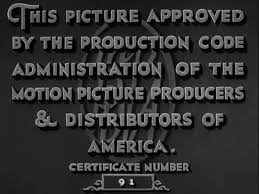The Epsilon Theory podcast is free for everyone to access. You can grab the mp3 file below, or you can subscribe at:
Cursed Knowledge is our latest podcast that explores how narratives, for better and worse, have shaped our world without us noticing. The world is full of people pushing their version of reality on us and it’s time to expose the truth. No matter how much you might wish we hadn’t.

The Golden Age of Hollywood was full of drama. On and off screen. It was the age of carefully cultivated images. Fake names and secret procedures. And it was the age of censorship. The Hays Code and the censorship office had more influence on the film industry than any actor, director, or producer ever could. They had full control over what Hollywood made. Well, almost. There were still a few loopholes left to exploit.












My favorite old movie is “The Philadelphia Story” made in 1940.
Another home run for Cursed Knowledge as Harper Hunt explains why Big Politics, Big Business & Big Media (Hollywood anyway) had a tangled web of reasons for censoring anti-Nazi (yes, anti-Nazi) movies in the 1930s.
The fight for free speech/against censorship is evergreen.
I love that movie! It was one of the first classic movies I ever watched and made me a lifelong fan of Katharine Hepburn.
So I spent a few minutes trying to find the Black Legion study guide that was sent to schools along with the movie in 1939 after winning the award from the Progressive Education Association. I was interested in learning what discussion questions were included.
I didn’t have any luck finding it or even any references about it after a quick search. However, I did discover the 1937 Black Legion Warner Bros. Pressbook. It was pretty interesting to skim through so I thought I’d post in case anyone else was interested in checking it out.
Below is a direct link to a PDF hosted by the Internet Archive. It’s a pretty hefty 25mbs so it might take a moment to fully load in a browser.
The study guide is pretty obscure! It’s no longer in circulation and isn’t well known at all. I discovered it in my research in the archives at the Margaret Herrick Library in Los Angeles. A lot of the information and sources for this podcast (and the thesis it’s based on) came from specific film archives in LA.
The Warner Brothers archive is actually hosted by USC. I was able to see production notes, internal memos, and pretty much everything about any WB movie.
I imagine that would be a highly enjoyable and interesting archive to dig through to learn about the ‘moving pictures’ industry! Is the film/entertainment industry something you studied in school or were pursuing as a career in some form? Or is it just an area of interest for you?
I’ve been enjoying the Cursed Knowledge subjects and how they relate to the topics discussed here at ET. Also, and I hope this comes off as the complement its intended to be…I enjoy learning about these topics in a light, fun and easily digestible format as a complement to Ben’s much more dense and serious notes; which take much longer for me to unravel and digest before I’m able to figure out and see how the world is going to end. I’m just glad I already have a wood stove in my basement, natural gas fireplace and stove upstairs. Energy is life! Ha!
A bit of both! I actually minored in cinema studies at USC. My major was history and my honors thesis was a way for me to combine the two. I’ve always loved learning about how movies are made and the history of the film industry. While I was living in LA I was fortunate enough to have some internships that allowed me to get more hands on experience with the production and distribution side. I also got to take classes at the best film school in the world which was amazing.
I’m so glad to hear that you enjoy the podcast! I love researching and writing them and, yes, the goal is to make them all a bit more lighthearted and easier to digest than the typical ET fare. I find I have an easier time understanding some of the narratives and ideas we talk about when they’re presented through a more relatable example. So I take an ET idea and try to connect it with one or two stories to help new and old readers visualize it.
Hi Harper:
I came across this podcast on Spotify as I was walking the track at the YMCA this morning. I was glad I chose to listen. What you presented remains relevant, especially in light of 1) the recent debate in regard to the right to free speech on college campuses; 2) the comparison of the self-imposed censorship in the movie industry in the 1930s(and how that worked out) with what has happened lately with social media’s stepping into a self-censorship role (with a nudge from the government); and 3) the recent rise in the public expression of antisemitism on college campuses and spillover onto the public square. Have you thought about reissuing the podcast, as Ben has done recently with several of his older notes,? History may not repeat itself, but sometimes it comes eerily close. Keep up the good work.